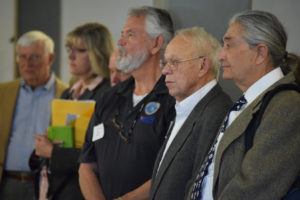DENVER, Colo. – “Among veterans, there are currently 20 suicides reported on average per day,” said John Kelley, the CEO of CereScan and a veteran of the Vietnam War. “But the most startling number is that those suicides have now amounted to more casualties than the entire losses of my generation in Vietnam.”
Kelley was speaking at the Colorado Veterans Treatment Courts Conference, a gathering of the legal professionals and social workers who serve in the state’s Veterans Treatment Courts. These special courts attempt to keep veterans who have been charged with non-violent crimes out of the justice system by connecting them with mental health services and substance abuse programs.
Held at the Veteran Services Center in downtown Denver, the conference was attended by treatment court judges, district attorneys, and probation officers, as well as veterans and their advocates. Several state senators and representatives spoke at the event, including former Colorado governor Bill Ritter, who provided the opening remarks.

State politicians from both sides of the aisle expressed their support for the Veterans Treatment Courts.
“Over the last 14 years, almost a trillion dollars has been spent privately and publicly to address PTSD and traumatic brain injury,” continued Kelley. “There are people doing great research at Johns Hopkins, Harvard, and Stanford. These are some of the best minds in the industry. And do you know how much they’ve moved the needle on suicides? Zero.”
According to Kelley, veterans who have served multiple tours, engaged in extensive combat, or launched shoulder-fired missiles tend to experience mental health issues more frequently than their peers. These mental health issues can in turn lead to social issues like criminal behavior and substance abuse – the very problems the Veterans Treatment Courts attempt to address. As Kelley noted, mental health issues also appear to contribute to the high rate of suicide among veterans.
“What these numbers say is that we have an epidemic,” said Kelley. “And we have to take it on ourselves to find solutions. It is my belief that if we apply skill sets like those we’ve developed at CereScan, there’s hope we may be able to address many of the neurological conditions prevalent among veterans today.”
CereScan regularly works with veterans suffering from post-traumatic stress disorder, traumatic brain injury, and toxic brain injury. After a preliminary examination, which includes a comprehensive clinical history, veterans are scanned in one of the company’s imaging facilities. CereScan’s software then compares each veteran’s data with the thousands of patient records stored in its database, searching for patterns indicative of neurological damage or disease. Once the analysis is complete, the company’s clinicians report the software’s findings to medical professionals, who use them to accurately diagnose each veteran’s condition and develop treatment plans tailored to meet their needs.
According to Kelley, CereScan’s services can complement the efforts of the Veterans Treatment Courts. He especially sees his company aiding judges in their deliberations by precisely identifying the presence of war-related trauma.
“Not all brain injuries are the same, and they’re not all going to be treated the same way,” explained Kelley. “If we can give judges better information about a veteran’s neurological issues, then we may be able to direct them to the best course of action for that veteran.”
Like the coverage that CyberMed News provides? Follow us on Twitter, LinkedIn, and Facebook to keep up-to-date on the latest developments in digital health.






Be the first to comment on "Improving the Diagnosis of War-Related Trauma"